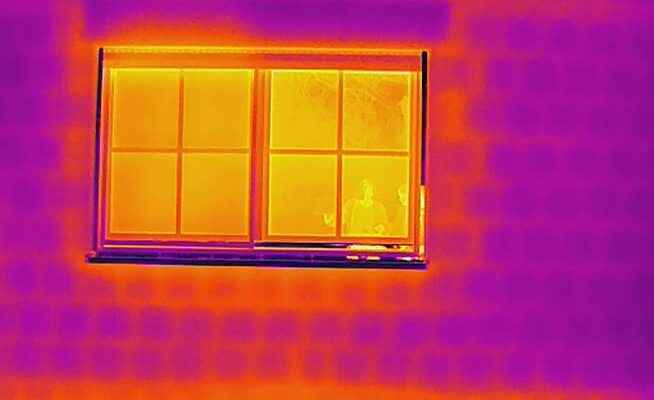There were no resources for temperature controls, and some of the measures in the Ordinance on Gas Restrictions would have undesirable effects. The cantonal energy directors criticize this.
Thermal analysis photo of an apartment.
As of this week, late summer is finally over. Without heating, the temperature in some rooms in the lowlands is already falling below 19 degrees. This gives a first taste of what many households could expect in the coming winter. Because if gas becomes scarce in Switzerland, its consumption should be reduced with the help of sometimes drastic regulations. It is unclear when the measures will come into force. The Federal Council decides that.
However, the mechanisms with which gas consumption is to be reduced are already known. The Federal Council outlined its plans in two draft ordinances at the end of August and sent them out for consultation. In the event of a gas shortage, swimming pools or saunas should no longer be allowed to be heated if they are connected to the gas network. The same applies to parts of the building that are not used every day, such as holiday apartments.
The regulation, according to which gas should not be used for heating above 19 degrees, caused a particularly big stir. In extreme cases, energy sinners who disregard this could even face imprisonment. At least that’s what the State Supply Act says. However, the Federal Council decided at the end of August that it was up to the cantons to monitor compliance with the regulations.
Warning of cooling down to 16 degrees
But they are wondering how the whole thing should work in practice. They complain that some of the regulations are very difficult to implement and difficult to monitor. And: The federal government makes it too easy for itself if it doesn’t take care of such questions. This is what the cantonal energy directors wrote in their response to the Federal Council consultation, which is ending this week.
Controlling the temperature is also not as easy as many might have imagined. The cantons cite an example: if the temperature in a holiday apartment in an apartment building that is not used daily has to be lowered significantly, this means that the occupied neighboring apartment may have to be heated more. That is “problematic”.
Limiting the room temperature to 19 degrees can lead to similar inequalities in apartment buildings. If the central heating controller were set to 19 degrees, many apartments further away from the boiler room could only reach 16 to 17 degrees. The cantons are therefore demanding “the application of a tolerance range” – which, however, would probably make the regulation even more difficult to grasp and enforce.
Switch to electric heaters?
The canton of Zurich draws attention to another false incentive. He fears that the restrictions on gas could in some cases even have a counterproductive effect by promoting an additional electricity shortage. This is if residents switch to electric ovens to get to the usual temperature of over 19 degrees. So far, the Federal Council has not announced a ban on electric heaters.
If the Federal Council restricts the use of gas, it must also do the same for electricity for the reason mentioned, the canton of Zurich demands. Swisspower, an association of municipal and regional energy suppliers, takes a similar view. The supply situations for gas and electricity are closely linked. If there is a shortage of gas, there is a risk that electricity will also run out, according to Swisspower. Therefore, sacrificial symmetry is appropriate.
It gets even more complicated when it comes to controls and sanctions. The cantons are noticeably annoyed that the federal government is passing the ball to them alone: “In our view, the blanket transfer of enforcement to the cantons without specifying more precisely what should be controlled – and how any sanctions should be designed – is not implementable nor acceptable,” they write.
A tug like Corona
Your comments give an idea of how little desire the cantons feel to bring the citizens into line here. The police will have no resources “to check in private households and companies whether the sauna is switched off or the heating temperature is maintained”. Clearer criteria are therefore needed as to what needs to be checked, “otherwise every canton does it differently”.
In numerous other points, the energy directors, but also Swisspower, propose adjustments and point out inconsistencies – for example with certain exceptions. Much is reminiscent of the tugging in the implementation and enforcement of the Corona measures. At that time, however, it became apparent that controls and sanctions hardly played any role in everyday life. Not least because the rules were easy to understand and widely accepted, at least in the initial phase.
Gas restrictions, on the other hand, appear to be trickier and more complex. And energy directors are already warning that things could get even more challenging as the winter progresses. In the event of a power shortage, all of the criticisms mentioned also apply to the electricity sector, they state – and add a warning: “The regulation of the exceptions is likely to be even more complex there.”
